- Home
- Frank Herbert
The Godmakers Page 12
The Godmakers Read online
Page 12
Orne wet his lips with his tongue. “Shapes?”
“The historical record is clear,” Emolirdo said. “Men have bent wires, coiled them, carved bits of plastic, jumbled odd assortments of apparently unrelated objects ... and miraculous things happen. A smooth metal surface becomes tacky as though smeared with glue. A man draws a pentagram on a certain floor and flames dance within it. Smoke curls from a strangely shaped bottle and suddenly obeys a man’s will. These are all shapes, you see?”
“So?”
“Then there are certain living creatures, including humans, who conceal such a focus within themselves. They walk into ... nothing and reappear light-years away. They have only to look at a person suffering from an incurable disease and the disease is cured. They raise the dead. They read minds.”
Orne tried to swallow in a dry throat. Emolirdo spoke with such an air of confidence, of conviction. This was something beyond blind faith.
“But how does it help to call these things psi?” Orne asked.
“It takes these phenomena out of the realm of blind fear,” Emolirdo said. He bent toward Orne’s bedside light, thrust a fist between the light and the green wall at the head of the bed.
“Look at this wall.”
“I can’t turn my head,” Orne said.
“Sorry.” Emolirdo withdrew his hand. “I was just making a shadow. You can imagine it. Let us say there were sentient beings confined to the flat plane of that wall and they saw the shadow of my fist. Could a genius among them imagine the shape which cast the shadow—a shape projected from outside of his dimension?”
“It’s an old, but interesting, question,” Orne said.
“What if a being within the wall plane fashioned a device which projected into our dimension?” Emolirdo asked. “He would be like the legendary blind men studying the elephant. His device would respond in ways that would not fit his dimensions. He’d have to guess at the new patterns, set up all sorts of optional postulates.”
The skin of Orne’s neck began to itch maddeningly under the bandage. He resisted the urge to probe there with a finger. Bits of Chargon’s folklore flitted through his memory: the magicians of the forest, the little people who granted wishes in ways that made the wishers regret their desires, the cavern where the sick were cured.
The quick-heal itching lured his finger with almost irresistible force. He groped for a pill on his bedstand, gulped it, waited for the relief.
“You are thinking,” Emolirdo said.
“You put a new psi amplifier in my neck,” Orne said. “For what purpose?”
“It’s an improved device for signaling the presence of psi activity,” Emolirdo said. “It detects psi fields, the presence of focal shapes. It amplifies your latent abilities. It enables you better to resist psi-induced emotions and you can detect motivations in others through the reading of their emotions. It may enable you to detect dangers to your person when those dangers still are some distance away in time—prescience, if you will. I’m laying on some parahypnoidal sessions for you which will make these effects more understandable to you.”
Orne felt a tingling in his neck, a vacant sensation in his stomach that wasn’t related to hunger. Danger?
“You’ll recognize the prescient sensation,” Emolirdo said. “It’ll come upon you as a peculiar kind of fear, perhaps mistaken for hunger. You’ll sense a lack of something, perhaps inside you or in the air you’re breathing. It’s a very trustworthy signal of danger.”
Orne felt the vacant sensation in his stomach. His skin was clammy with perspiration. The room’s air tasted stale in his lungs. He wanted to reject the sensations and Emolirdo’s suggestive conversation, but a fact named Stetson remained. Nobody in the I-A could be more coldly skeptical and Stet had said to go through with this.
There was also the matter of the transceiver he had wished from his flesh.
“You’re a little pale,” Emolirdo said.
Orne managed a tight smile. “I think I feel your prescient warning right now.”
“Ahhhh. Describe your sensations.”
Orne obeyed.
“Odd that is should happen so soon,” Emolirdo said. “Can you identify a source for this danger?”
“You,” Orne said. “And Amel.”
Emolirdo pursed his lips. “Perhaps the psi training itself is dangerous to you. That is odd. Especially if you do turn out to be a psi focus.”
***
Chapter Nineteen
When a wise man does not understand, he says: “I do not understand.” The fool and the uncultured are ashamed of their ignorance. They remain silent when a question could bring them wisdom.
—Sayings of the ABBODS
There was no real excuse to wait on the transport’s ramp any longer, Orne told himself. He had overcome the first staggering impact of Amel’s psi forces. But the prescient awareness of peril remained with him like a sore tooth. He felt the heat, the heavy toga. Perspiration soaked him.
And his stomach said: Wait.
He took a half step toward the escalfield and the sense of vacancy within him expanded. His nostrils caught the acrid bite of incense, an odor so strong it rode over the oil-and-ozone dominance of the spaceport.
In spite of training and carefully nurtured agnosticism, he experienced a sensation of awe. Amel exuded an aura of magic that defied disbelief.
It’s only psi, Orne told himself.
Chanting and keening sounds lifted like an aural fog from the religious warren. He felt memory fragments stirring from his childhood on Chargon: the religious processions on holy days ... the image of Mahmud glowering from the kiblah ... the azan ringing out across the great square on the Day of Bairam—
“Let no blasphemy occur, nor permit a blasphemer to live …”
Orne shook his head, thought: Now’d be a great time to get religion and bow down to Ullua, the star wanderer of the Ayrbs.
The roots of his fear went deep. He tightened his belt, strode forward into the escalfield. The sense of danger remained, but grew no stronger.
The escalfield’s feathery touch lowered him to the ground, disgorged him beside a covered walkway. It was hotter on the ground than on the ramp. Orne wiped perspiration from his forehead. A cluster of white-clad priests and students in aqua togas pressed into the thin shade of the covered walkway. They began to separate as Orne approached, leaving in pairs—a priest with each student.
One priest remained—tall, a thick body, a heavy feeling about him as though the ground would shake when he walked. Another Chargon native? Orne wondered. His head was shaved. Deep scratch lines patterned his face. Dark eyes glowered from beneath overhanging gray brows.
“You Orne?” the priest rumbled.
Orne stepped under the walkway. “Yes.” The priest’s skin betrayed a yellow oiliness in the shadows.
“I am Bakrish,” he said. He put slab hands on his hips, glared at Orne. “You missed the ceremony of lustration.”
“I was told I could come down at my own-time,” Orne said.
“One of those, eh?” Bakrish said.
Something about the heavy figure, the glowering face reminded Orne of an I-A training sergeant on Marak. The memory restored, Orne’s sense of balance brought a grin to his face.
“You find something amusing?” Bakrish demanded.
“This humble face reflects happiness to be in your presence upon Amel,” Orne said.
“Yeah?”
“What’d you mean one of those?” Orne asked.
“You’re one of those talents who has to get his Amel balance,” Bakrish said. “That’s all. Come along.” He turned, strode off under the walkway’s cover, not looking to see if Orne followed.
Amel balance? Orne wondered.
He set off after Bakrish, found he had to force himself into a half trot to keep up.
No moving walks, no hopalongs, Orne thought.
This planet is primitive.
The covered walk jutted like a long beak from a windowless l
ow building of gray plastrete. Double doors opened into a dim hall that washed Orne with cool air. He noted, however, that the doors had to be opened by hand and one of them creaked. The hall echoed with their footsteps.
Bakrish led the way past rows of narrow cells without doors, some of them occupied by murmuring figures, some piled with strange equipment, some empty. At the end of the hall there was another door which opened into a room large enough to hold one small desk and two chairs. Pink light filled the room from concealed exciters. The place smelled of fungus.
Bakrish crunched his frame into the chair behind the desk, motioned for Orne to take the other seat.
Orne obeyed, felt the stomach pangs of danger grow more acute.
Bakrish said: “As you know, we on Amel live under the Ecumenical Truce. The I-A intelligence service will have briefed you on the surface significance of this fact.”
Orne concealed surprise at this turn in the conversation.
Bakrish said: “What you must understand now is that there is nothing unusual about my assignment as your guru.”
“Why would it be thought unusual?” Orne asked.
“You are a follower of Mahmud and I am a Hynd and a Wali under divine protection. By the Truce, all of us serve the one God who has many names. You see?”
“No, I don’t see.”
“Hynd and Ayrb have a long tradition of enmity,” Bakrish said. “Did you know this?”
“I seem to have encountered a reference somewhere,” Orne admitted. “My own attitude is that enmity leads to violence and violence leads to war. I have taken an oath to prevent this progression.”
“Commendable, very commendable,” Bakrish said. “When Emolirdo told us about you, we had to see for ourselves, of course. That’s why you’re here.”
Orne thought: So Stet was right; the Psi Branch spies for Amel.
“You pose a fascinating problem,” Bakrish said.
Orne set his face in a blank mask, probed with his newly awakened psi awareness for an emotion, a weakness, any clue to the peril he sensed here. He said: “I thought it was a simple matter of my coming here as a student.”
“Nothing is truly simple,” Bakrish said.
As Bakrish spoke, Orne felt his sense of danger dissipate, caught the priest glancing toward the doorway. Orne whirled, caught a flicker of robe and sight of a wheeled object being pulled away.
Bakrish said: “That’s better. Now we have the tensor phase of your booster equipment. We can nullify it at will or destroy you with it.”
Orne fought to control shock, wondered: What kind of a bomb did Emolirdo have the medics plant in me? He thought of wishing the devices out of his flesh, but wondered if he could do that on Amel. The thought of failure loomed as more dangerous than letting the matter ride temporarily. He said:
“I’m glad you found something to keep you busy.”
“Do not sneer,” Bakrish said. “We have no wish to destroy you. We want you to use the devices which were given to you. That is why you got them and were taught to use them.”
Orne took two deep breaths. Psi training took over without conscious volition. He concentrated on the inner focus for calmness and it came like the wash of cool water. He became icy, observant, calm, sensitive to any psi force. And at the same time, thoughts blazed in his mind. This was not the pattern of events he had expected. Did they have him boxed?
“Have you any questions?” Bakrish asked.
Orne cleared his throat. “Yes. Will you help me to see the Abbod Halmyrach. I must find out why Amel is trying to destroy the …”
“All in its own time,” Bakrish said.
“Where do I find the Abbod?”
“When the time comes, it will be arranged for you to see him. He is nearby and awaits these events with great curiosity, I assure you.”
“What events?”
“Your ordeal, of course.”
“Of course. When you try to destroy me.”
Bakrish appeared puzzled. “Believe me, my young friend, we have no desire to cause your destruction. We have merely taken necessary precautions. These are dangerous matters which engage our attentions.”
“You said you could destroy me.”
“Only under the most dire necessity. You must understand the two basic facts here now: You want to find out about us and we want to find out about you. The best way for both of us to accomplish this is for you to submit to your ordeal. You really have no choice.”
“So you tell me!”
“I assure you.”
“So I’m supposed to let you lead me along like a grifka going to the slaughterhouse. Either that or you destroy me.”
“Bloody thoughts really are not suitable,” Bakrish said. “Look upon this as I do: It is an interesting test.”
“But just one of us is in danger.”
“I would hardly say that," Bakrish said.
Orne felt anger surge through him. For this, he had suffered the postponement of his wedding, the ministrations of medics who very likely had been directed by a traitor to the I-A, had undergone the grinding psi course. For this!
“I’m going to find out what makes you tick,” Orne grated, glaring at Bakrish, “When I do, I’m going to smash you.”
Bakrish paled. His yellow skin appeared sickly. He swallowed, shook his head. “You must be exposed to the mysteries,” he murmured. “It is the only way we know.”
Orne felt embarrassment at his burst of bravado, thought: Why is this joker afraid? He’s in the driver’s seat here, but my threat frightened him. Why?
“Do you submit to the ordeal?” Bakrish ventured.
Orne pushed himself back in the chair. “You said I have no choice.”
“Truly, you have not.”
“Then I submit. But the price is an interview with the Abbod!”
“Of course ... if you survive.”
***
Chapter Twenty
We come from the All-One and return to the All-One. How can we keep anything from the Source that was and the End that is?
—Sayings of the ABBODS
“He has arrived, Reverend Abbod,” the priest said. “Bakrish is with him now.”
The Abbod Halmyrach stood at a scribe’s easel, his bare feet on an orange rug that matched his long robe. The room, its windows shuttered against Amel’s glaring sunlight, appeared shadowy and archaic. Dim light came from ancient glowglobes which hovered in the upper corners of the room. There were wood walls and a fireplace with orange coals in it behind the Abbod. His narrow face with its long nose and thin-lipped mouth appeared calm, but the Abbod was acutely aware of his room, of the oily shadows on the wood walls, the scratching of the priest’s sandals on the floor beyond the rug, the faint stirrings of the fire dying in the fireplace.
This priest reporting now, Macrithy, was one of the Abbod’s most trusted observers, but the man’s appearance—long black hair with deep sideburns framing a smoothly rounded face, the dark stovepipe suit and reversed white collar—bothered the Abbod. Macrithy looked too much like an historical illustration from accounts of the Second Inquisition. One did not, however, question religious accouterments which came under the freedoms of the Ecumenical Truce.
“I sensed his arrival,” the Abbod said. He turned back to the easel, writing with pen on paper because it pleased him to keep the ancient ways alive. “There does not seem to be any doubt he is the one.”
Macrithy said: “He has made the three transcendent steps, but there is no certainty he will survive his ordeal and discover you, who summoned him.”
“To discover has many meanings,” the Abbod said. “Have you read my brother’s report?”
“I have read it, Reverend Abbod.”
The Abbod looked up from his writing. “I saw the little green box, you know. I saw it in a vision in the instant before the Shriggar appeared to us. I also saw my brother and felt the transcendent influence on his emotions brought about by that moment. It fascinates me the way the prediction follows so p
recisely upon the Shriggar’s words. It tracks, as they say.” He returned to his writing.
“Reverend Abbod,” Macrithy said, “The game of war, the city of glass and the time of politics are past. I have studied your account of the god making. It is now time for us to fear the consequences of our daring.”
“And I am afraid,” the Abbod said, not looking up.
“We all are,” Macrithy said.
“But think of it,” the Abbod said, putting a punctuation mark on his writing with a flourishing gesture. “This is our first human! What have we touched in the past—a mountain on Talies, the Speaking Stone of Krinth, the Mouse God on Old Earth, animate and inanimate elements of that ilk. Now, we have our first human god.”
“There’ve been others,” Macrithy said.
“But not of our making!”
“We may regret it,” Macrithy muttered.
“Oh, I already do,” the Abbod said. “But there’s no changing that now, is there?”
***
Chapter Twenty-One
The day is short and the work is great, and the workers are lazy, but the reward is large and our Master urges us to make haste.
—Writings of the ABBOD HALMYRACH
“This is called ‘The cell of meditation-on-faith,’” Bakrish said, gesturing toward the room whose door he had opened for Orne.
“You are required to stretch out on the floor in there flat on your back. Do not sit or stand until I give permission. It is very dangerous.”
“Why?” Orne leaned in, studied the room.
It was a high and narrow place. Walls, floor and ceiling appeared to be white stone veined by thin brown lines like insect tracks. Pale-white light, sourceless and flat as skimmed milk, filled the room. A smell of damp stone and fungus permeated the space.
“This is a psi machine of great potency,” Bakrish said. “Flat on your back, you are relatively safe. Accept my word for it; I have seen the results of disbelief.” He shuddered.
Orne cleared his throat. He felt cold. The vacant place in his stomach was a distended bag warning him of terrible peril. He said: “What if I refuse to go through with this?”

 Direct Descent
Direct Descent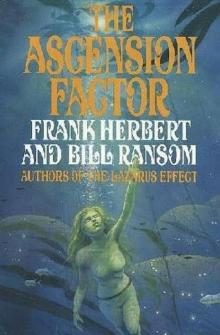 The Ascension Factor
The Ascension Factor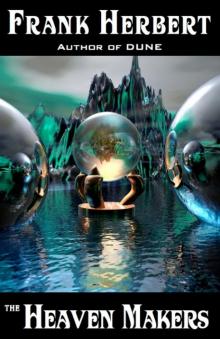 The Heaven Makers
The Heaven Makers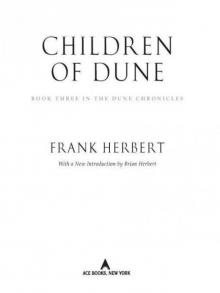 Children of Dune
Children of Dune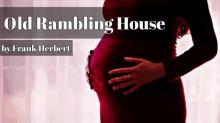 Old Rambling House
Old Rambling House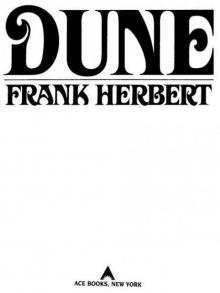 Dune
Dune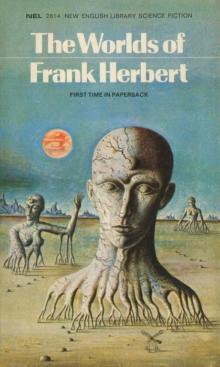 The Worlds of Frank Herbert
The Worlds of Frank Herbert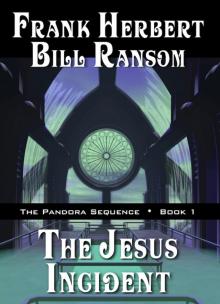 The Jesus Incident
The Jesus Incident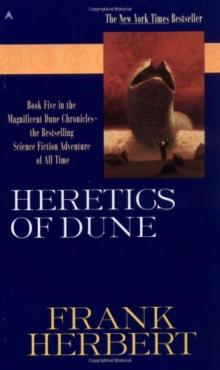 Heretics of Dune
Heretics of Dune Whipping Star
Whipping Star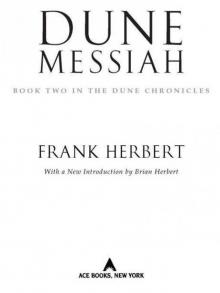 Dune Messiah
Dune Messiah Man of Two Worlds
Man of Two Worlds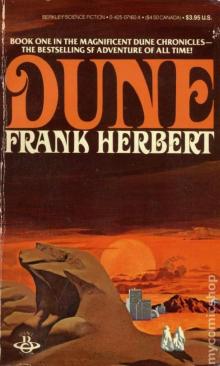 The Book of Frank Herbert
The Book of Frank Herbert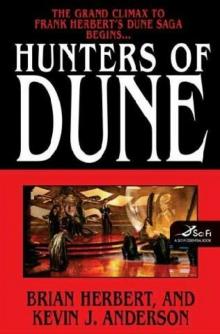 Hunters Of Dune
Hunters Of Dune The Tactful Saboteur
The Tactful Saboteur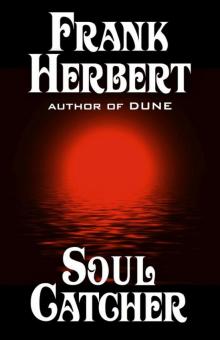 Soul Catcher
Soul Catcher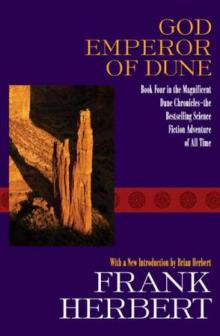 God Emperor of Dune
God Emperor of Dune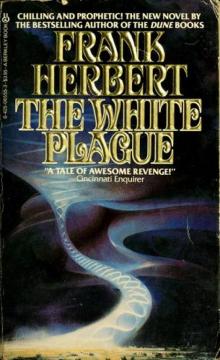 The White Plague
The White Plague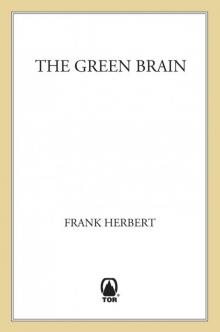 The Green Brain
The Green Brain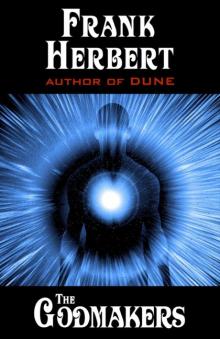 The Godmakers
The Godmakers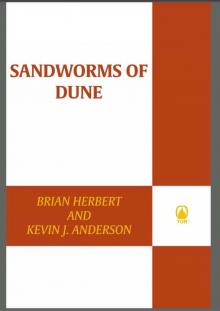 Sandworms of Dune
Sandworms of Dune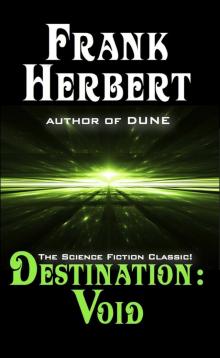 Destination Void
Destination Void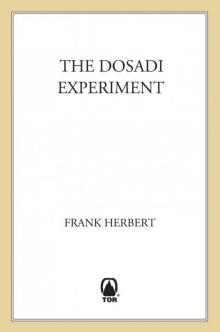 The Dosadi Experiment
The Dosadi Experiment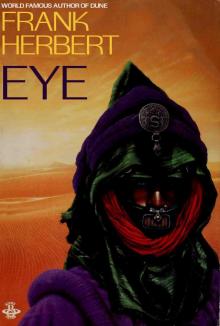 Eye
Eye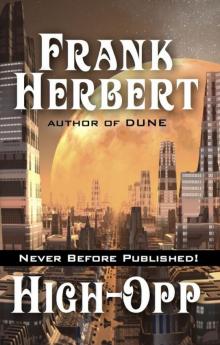 High-Opp
High-Opp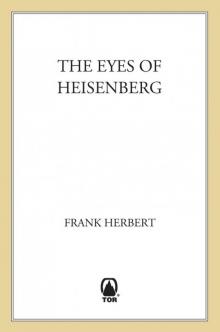 The Eyes of Heisenberg
The Eyes of Heisenberg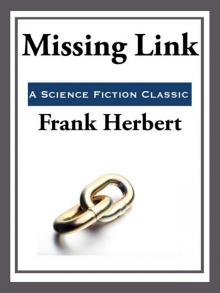 Missing Link
Missing Link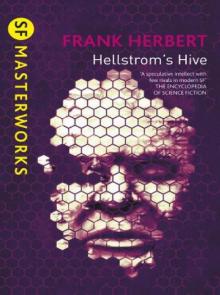 Hellstrom's Hive
Hellstrom's Hive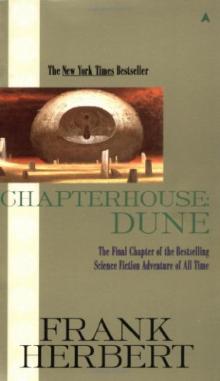 Chapterhouse: Dune
Chapterhouse: Dune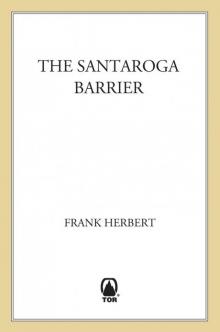 The Santaroga Barrier
The Santaroga Barrier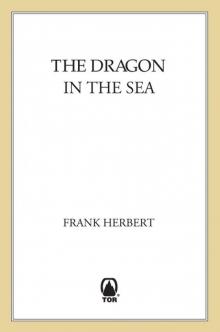 The Dragon in the Sea
The Dragon in the Sea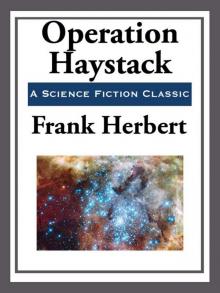 Operation Haystack
Operation Haystack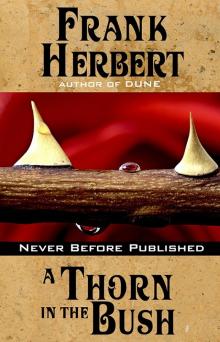 A Thorn in the Bush
A Thorn in the Bush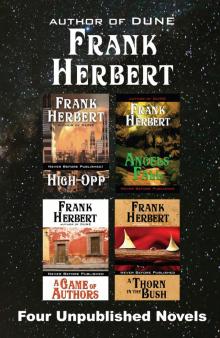 Four Unpublished Novels
Four Unpublished Novels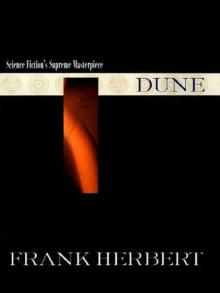 Dune dc-1
Dune dc-1 Jorj X. McKie 1 - Whipping Star
Jorj X. McKie 1 - Whipping Star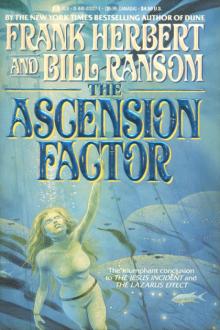 DV 4 - The Ascension Factor
DV 4 - The Ascension Factor Frank Herbert - Dune Book 4 - God Emperor Of Dune
Frank Herbert - Dune Book 4 - God Emperor Of Dune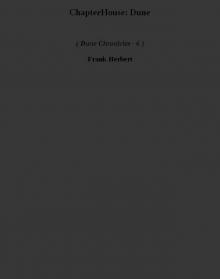 ChapterHouse: Dune dc-6
ChapterHouse: Dune dc-6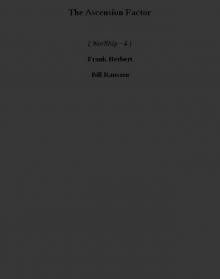 The Ascension Factor w-4
The Ascension Factor w-4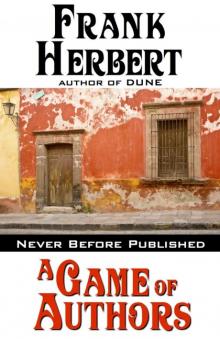 A Game of Authors
A Game of Authors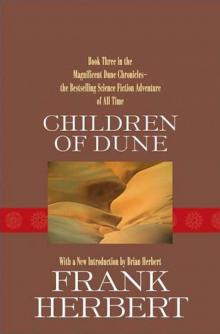 Children of Dune dc-3
Children of Dune dc-3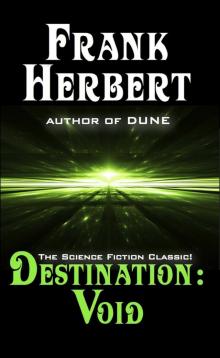 Destination: Void: Prequel to the Pandora Sequence
Destination: Void: Prequel to the Pandora Sequence The Collected Stories of Frank Herbert
The Collected Stories of Frank Herbert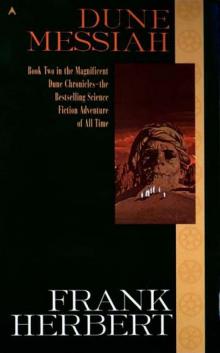 Dune Messiah dc-2
Dune Messiah dc-2 Frank Herbert - Dune Book 5 - Heretics of Dune
Frank Herbert - Dune Book 5 - Heretics of Dune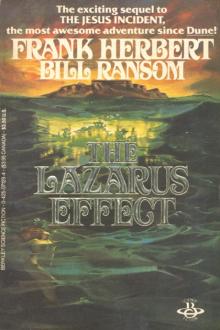 DV 3 - The Lazarus Effect
DV 3 - The Lazarus Effect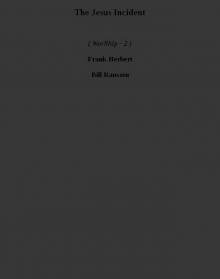 The Jesus Incident w-2
The Jesus Incident w-2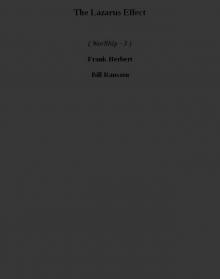 The Lazarus Effect w-3
The Lazarus Effect w-3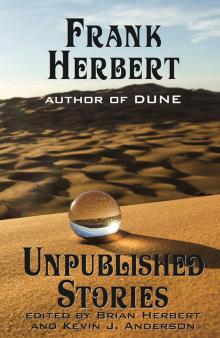 Frank Herbert
Frank Herbert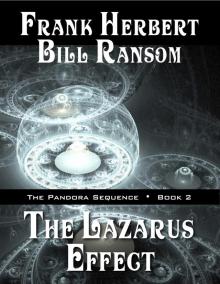 The Ascension Factor: Pandora Sequence
The Ascension Factor: Pandora Sequence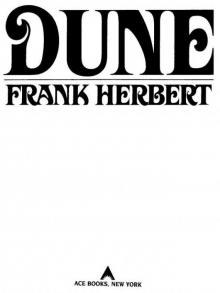 Dune (40th Anniversary Edition)
Dune (40th Anniversary Edition)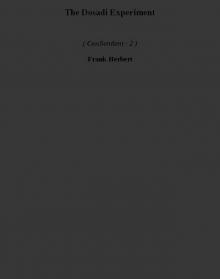 The Dosadi Experiment c-2
The Dosadi Experiment c-2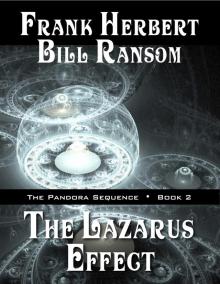 The Lazarus Effect
The Lazarus Effect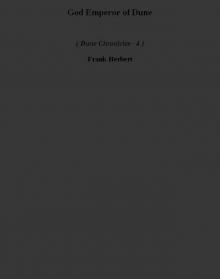 God Emperor of Dune dc-4
God Emperor of Dune dc-4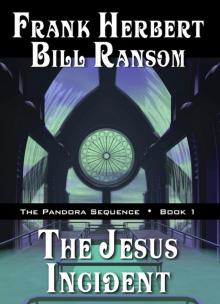 The Pandora Sequence: The Jesus Incident, the Lazarus Effect, the Ascension Factor
The Pandora Sequence: The Jesus Incident, the Lazarus Effect, the Ascension Factor The Green Brain (v4.0)
The Green Brain (v4.0) The Heaven Makers (v4.0)
The Heaven Makers (v4.0)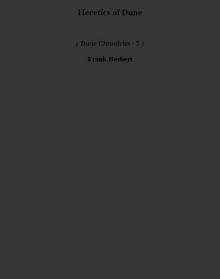 Heretics of Dune dc-5
Heretics of Dune dc-5